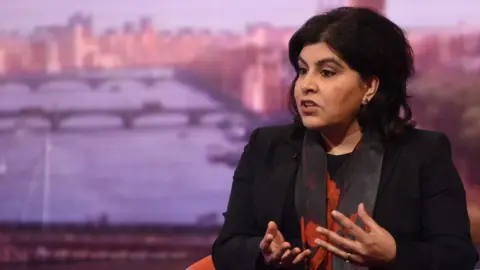Government rejects Islamophobia definition ahead of debate
 Reuters
ReutersThe government has rejected a definition of Islamophobia created by a cross-party group of MPs.
The All-Party Parliamentary Group on British Muslims wanted to define it to tackle what it called a "social evil".
But a government spokesman said the wording needed "further careful consideration" and had "not been broadly accepted".
The secretary general of the Muslim Council of Britain, Harun Khan, called the decision "truly extraordinary".
MPs will debate the definition in Parliament on Thursday. It says: "Islamophobia is rooted in racism and is a type of racism that targets expressions of Muslimness or perceived Muslimness."
The wording has the support of a number of political parties - including Labour, the Liberal Democrats and the Scottish Conservatives - and several Muslim groups.
'Irresponsible scaremongering'
But concerns have been raised that the definition is too vague and could undermine efforts to tackle extremism.
In a letter to Prime Minister Theresa May - seen by the Times - Martin Hewitt, who chairs the National Police Chiefs' Council, said it could cause confusion among officers and hamper the fight against terrorism.
Former Conservative chair Baroness Warsi - who became the first Muslim woman to attend cabinet, in 2010 - said the letter was "irresponsible scaremongering".
She told BBC Radio 4's Today programme that "a non-legally binding working definition" would not affect the work of the police and urged the government to back it.

The APPG announced its definition in December, saying the fact Islamophobia had "surpassed the dinner table test" - a term used by Baroness Warsi in 2011 to describe how being Islamophobic had become socially acceptable - still needed addressing.
In its report, the group said: "More than 20 years since the term Islamophobia entered our political and policy lexicon, and almost a decade since its 'passing the dinner table test' was raised, this is a good time to stop and survey the progress that has been made in challenging this social evil.
"It is with this intent, and to deter a further 20 years before substantive progress is made in tackling its blight on our British Muslim citizens, that the APPG on British Muslims opened its inquiry into a working definition of Islamophobia.
"No amount of documentation of the evidence of discriminatory outcomes faced by Muslims... can satisfy our desire to reverse these results if we cannot begin from the point of an agreed definition."
'Community tensions'
Critics have questioned whether the definition could lead to issues with freedom of speech.
An open letter signed by over 40 academics, writers and campaigners said it was "unfit for purpose", warning its "uncritical and hasty adoption" would "aggravate community tensions" and "inhibit free speech about matters of fundamental importance".
But the MCB's Mr Khan said the conclusion was "deeply disingenuous" and the government appeared to be "wilfully misreading of the definition and aligned to a number of bad faith actors whose views - rather than those of Muslim communities - appear to be influencing this decision".
"Being critical of Islam or any religion does not make you an Islamophobe," he added. "You are only an Islamophobe if you use the language of racism targeting expressions of Muslimness."
'Denial flows'
Ms Shah, Labour's shadow minister for Women and Equalities, backs the definition and accused the government of being "in denial".
She said: "The Conservative Party is in denial about Islamophobia and other forms of racism in its ranks and that denial flows from the very top.
"If Theresa May refuses to adopt the definition of Islamophobia, the message she sends to the Muslim community will be heard loud and clear."
A government spokesman said: "Any hatred directed against British Muslims and others because of their faith or heritage is utterly unacceptable.
"We are conscious that the APPG's proposed definition has not been broadly accepted - unlike the IHRA definition of anti-Semitism before it was adopted by the UK government and other international organisations and governments.
"This is a matter that needs further careful consideration."
